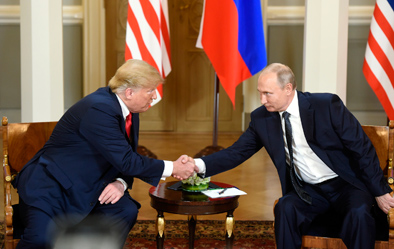Trump-Putin meeting will bring nothing new
- By Sumantra Maitra
 0 Comment(s)
0 Comment(s) Print
Print E-mail China.org.cn, July 21, 2018
E-mail China.org.cn, July 21, 2018

As predicted, there was, after all, no grand bargain made at Donald Trump and Vladimir Putin's meet in Helsinki. As Trump completes his "global reorder" tour, as named by some international relations experts, all eyes were on Finland, where the leaders of the two superpowers were set to meet. After Trump's passive-aggressive talk at NATO, and his bizarre U.K. tour – marred by controversy as he interfered in Brexit talks and committed the diplomatic gaffe of walking in front of the Queen – there was some expectation that he might be mercurial in his meeting with Putin.
The idea was that Trump might come to a deal with Putin, giving out Syria and other Middle Eastern countries, and perhaps recognizing Crimea. Had that been the case, it would have been the most significant change of direction in U.S. foreign policy since the end of World War II.
However, nothing of that sort happened. In the joint press conference, President Putin said that the Cold War is a thing of the past, from a bygone era of acute ideological confrontation. He said the world has changed dramatically and new relations should reflect the new reality. Putin also said that Russia and America are not geopolitical allies and that the interests of the two nations might therefore naturally differ, but called upon both countries to deal with each other based on common interests. Asked about his views on the U.S. presidential election, Putin avoided accepting responsibility for any interference on Russia's part, but simply stated that he did want Trump to win, because Trump is the only one who wanted a shift in the U.S. relationship with Russia.
The usual talking points were of course covered. Putin said that global American anti-missile defense is a knock to the already fragile balance of power and is therefore not in Russia's interest. He also warned against any future space race and weapons in space. Putin also maintained that there are areas where the U.S. and Syria can cooperate. "We favor the continued cooperation in counter-terrorism and maintaining cyber-security," he said, adding that establishing peace in Syria and working jointly on reconciliation is an example to emulate.
In turn, President Trump acknowledged that Russia didn't interfere in American elections and avoided putting the blame on his counterpart, as expected. When asked what he thinks about Russian gas in the EU, Trump said, "I think that we will be completing when you talk about the pipeline. I'm not sure, necessarily, that it's in the best interests of Germany or not, but that was a decision that they made."
Most strikingly, when asked about the ongoing investigation and its impact on diplomatic relations, Trump stated, perhaps in terms which are striking, that both the U.S. and Russia are to blame, but that things are changing. "I think that the United States now has stepped forward along with Russia, and we're getting together and we have a chance to do some great things, whether it's nuclear proliferation in terms of stopping – you have to do it, ultimately that's probably the most important thing that we could be working on," President Trump said, adding that both sides have made mistakes, in particular with the probe.
Despite the bonhomie, however, there was no material change. There were no new START talks, only lip service paid to terrorism and space cooperation, no new treaties signed, no specifics given about business or student exchanges. There was no grand bargain on Syria, or change of force posture in Middle East, and Ukraine wasn't even mentioned.
The reality is that Trump likes Putin personally maybe, but that will not change the fundamental differences between the U.S. and Russia. This is not a pre-Magna Carta monarchy, and the great power foreign policies are defined by structural forces and interests, not by individuals, who are unlikely to have any agency. Unfortunately, due to Trump's capitulating performance, and the timing of indictments against Russian agents in the U.S., whatever goodwill Russia had among the Republicans will disappear, and U.S.-Russia relations will continue to hurtle toward a freefall.
Sumantra Maitra is a columnist with China.org.cn. For more information please visit:
http://www.china.org.cn/opinion/SumantraMaitra.htm
Opinion articles reflect the views of their authors only, not necessarily those of China.org.cn.






Go to Forum >>0 Comment(s)